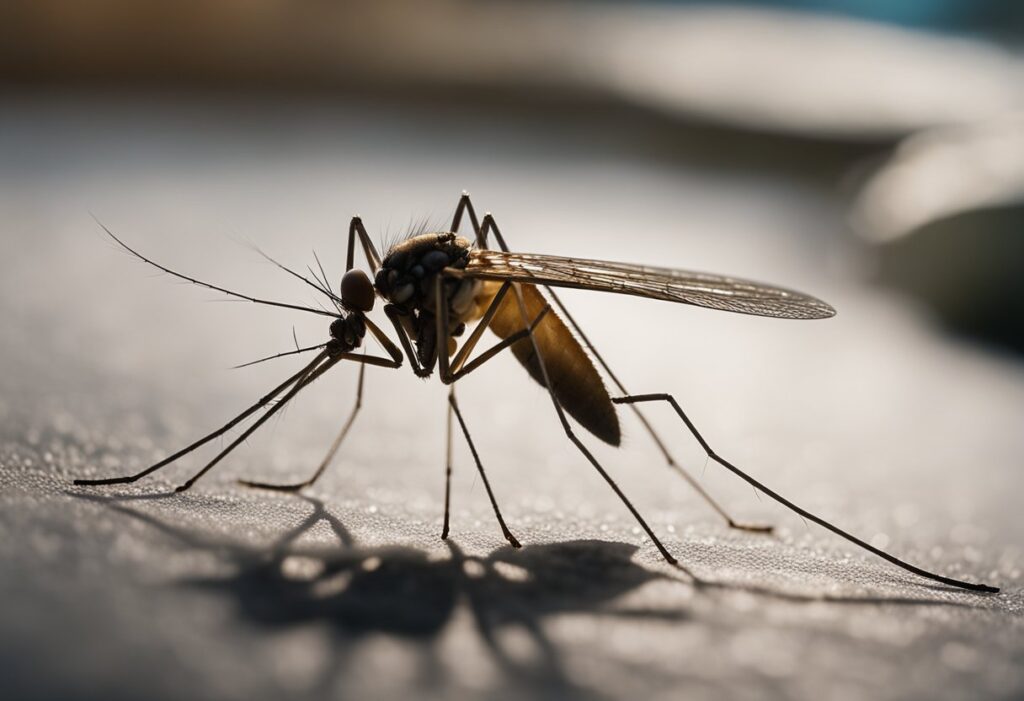Mosquitoes: A Hazard to Your Pet’s Health
Mosquitoes are known for their irritating bites and the potential diseases they can transmit to humans. However, many pet owners may not realize that mosquitoes pose a significant threat to their furry companions as well. Mosquitoes can transmit a variety of diseases to pets, including heartworm and West Nile virus, which can cause serious health issues and even be fatal if left untreated.

Heartworm is a particularly dangerous disease that can be transmitted to dogs and cats through the bite of an infected mosquito. The worms can grow up to a foot long and live in the heart, lungs, and blood vessels of the infected animal, causing severe damage to their organs. Unfortunately, heartworm is difficult and expensive to treat, making prevention crucial for pet owners.
In addition to heartworm, mosquitoes can also transmit other diseases to pets, including West Nile virus, Eastern equine encephalitis, and Zika virus. While these diseases are less common in pets, they can still cause serious health issues and should not be ignored. It’s important for pet owners to take preventative measures to protect their furry friends from these potential hazards.
Understanding the Mosquito Threat

Mosquitoes are a common pest that can pose a significant threat to the health of pets. Understanding the mosquito threat is essential to protect your furry friends from potential harm.
Mosquito Species Dangerous to Pets
There are over 3,000 species of mosquitoes worldwide, but not all of them are dangerous to pets. Some of the most common mosquito species that can pose a threat to pets include Aedes, Anopheles, and Culex.
Aedes mosquitoes are known for transmitting heartworm disease, which can be fatal if left untreated. Anopheles mosquitoes can transmit malaria, while Culex mosquitoes can transmit West Nile virus, Eastern equine encephalitis, and St. Louis encephalitis.
Diseases Transmitted by Mosquitoes
Mosquitoes can transmit a variety of diseases to pets, including heartworm disease, West Nile virus, and Eastern equine encephalitis. Heartworm disease is caused by a parasitic worm that is transmitted to dogs and cats through the bite of an infected mosquito. The worms can grow up to a foot long and can cause serious damage to the heart, lungs, and blood vessels.
West Nile virus can cause flu-like symptoms in pets, including fever, lethargy, and loss of appetite. In severe cases, it can cause neurological damage and even death. Eastern equine encephalitis is a rare but serious disease that can cause inflammation of the brain and spinal cord in pets.
To protect your pets from the mosquito threat, it’s essential to take preventative measures, such as using mosquito repellents, removing standing water, and keeping your pets indoors during peak mosquito activity. By taking these steps, you can help keep your pets safe and healthy.
Preventive Measures for Mosquito Bites
Mosquitoes can cause a range of health problems for your pets, including heartworm disease and allergic reactions. To protect your furry friend from these hazards, it’s important to take preventive measures against mosquito bites. Here are some effective ways to do so:
Outdoor Protection
When your pet is spending time outdoors, it’s important to take steps to prevent mosquito bites. One of the most effective ways to do so is by using mosquito repellent. There are many different types of repellents available, including sprays, lotions, and collars. Look for products that contain DEET or other active ingredients that are known to repel mosquitoes.
Another way to protect your pet from mosquito bites is by keeping them indoors during peak mosquito activity times. Mosquitoes are most active at dawn and dusk, so try to keep your pet indoors during these times if possible. If your pet must be outside during these times, consider using a mosquito net or other barrier to keep mosquitoes away.
Indoor Protection
Even when your pet is indoors, they can still be at risk of mosquito bites. To prevent this, make sure your home is well-sealed and free of standing water. Mosquitoes breed in standing water, so it’s important to eliminate any sources of standing water in and around your home.
You can also use mosquito traps or zappers to help control the mosquito population in your home. These devices work by attracting mosquitoes and then killing them, helping to reduce the number of mosquitoes that are able to bite your pet.
By taking these preventive measures, you can help protect your pet from the hazards of mosquito bites. Remember to always consult with your veterinarian to determine the best course of action for your pet’s specific needs.
Recognizing Mosquito-Borne Illnesses in Pets
Mosquitoes can transmit several diseases to pets, including heartworm disease, West Nile virus, and Eastern equine encephalitis. Early recognition of the signs and symptoms of mosquito-borne illnesses can help prevent serious health complications.
Signs and Symptoms
The signs and symptoms of mosquito-borne illnesses in pets may vary depending on the type of disease and the severity of the infection. Some common signs to watch for include:
- Lethargy
- Loss of appetite
- Vomiting
- Diarrhea
- Coughing
- Sneezing
- Difficulty breathing
- Fever
- Seizures
- Paralysis
If you notice any of these symptoms in your pet, it is important to seek veterinary care immediately.
Diagnostic Tests
Diagnosing mosquito-borne illnesses in pets can be challenging, as many of the symptoms are similar to other diseases. Your veterinarian may recommend various diagnostic tests to determine the underlying cause of your pet’s illness, including:
- Blood tests to detect the presence of antibodies or antigens
- Imaging tests, such as X-rays or ultrasound, to evaluate organ function
- Urine or fecal tests to check for the presence of parasites or other infectious agents
Just like in humans, early detection of mosquito-borne illnesses in pets allows for prompt treatment, which can improve treatment outcomes and reduce the severity of symptoms.
Treatment and Recovery
Medical Interventions
Once a mosquito-borne illness has been diagnosed in a pet, medical interventions are necessary to treat the symptoms and address any underlying complications. The specific treatment plan will depend on the type of illness and the severity of the symptoms.
For example, if a pet has heartworm disease, the veterinarian may prescribe medication to kill the adult worms and prevent new ones from developing. If a pet has contracted West Nile virus, supportive care may be necessary to manage symptoms such as fever and seizures.
In some cases, hospitalization may be necessary to provide intensive care and monitoring. It is important to follow the veterinarian’s instructions closely and administer any medications as directed.
Home Care
In addition to medical interventions, home care can also play a crucial role in a pet’s recovery from a mosquito-borne illness. This may include providing a comfortable and quiet environment, monitoring the pet’s temperature and hydration levels, and administering any prescribed medications.
Pet owners can also take steps to prevent further mosquito bites by using insect repellent and keeping their pets indoors during peak mosquito activity times. It is important to continue monitoring the pet’s symptoms and alert the veterinarian if there are any changes or concerns.
Overall, with proper medical care and home management, many pets are able to recover from mosquito-borne illnesses and return to their normal activities.





















